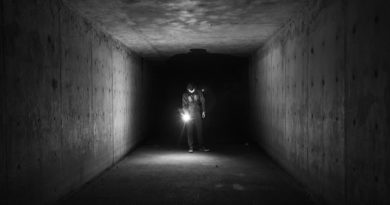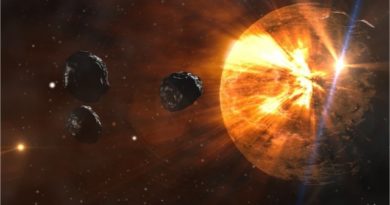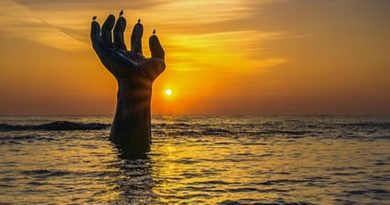Translations
“Why are you crying?” I asked Nola. It was morning, and I had gone to the edge of the forest to be alone. I found Nola bent over herself on a log, six feet from the tree-line.
“It’s Jerry.”
I looked for the bird, expected to hear him chirping out the rote of the Leaders in her dead mother’s voice. “What about him?”
She turned to me, still bent. Her hands were curled in front of her like witches’ claws. Under her huge nose, her eyes were wet and reproachful. “You hated Jerry. Now he’s dead.”
I looked at Nola, my face drawn downward, shaking my head. “I didn’t hate him,” I said. “I’m so sorry. How did he die?”
She gazed into her hands and gave a sad shrug. “Old age, I guess,” she said. “I looked in his cage, and he was dead. Lying there stiff.”
I perched on the log and put my hand on her back. Then I didn’t know what to do. I traced a circle, barely touching the fabric of her sweater. “I’m really sorry he died.” I felt the unexpected sting of a tear behind my eyes.
In the dark, through the soft sounds of sleeping, I slipped toward Juno’s mat. Here, he didn’t have his own space; like the rest of us, he slept in the rows. I stopped short, seeing through the near-total darkness that his eyes were open, gazing in my direction. So he was expecting me, I thought, waiting. What to say? Supplicate him? Lie down beside him? I didn’t want to lie down, and I didn’t want to want to. I crouched, waiting for him to speak, until I realized he had painted open eyes on his closed eyelids. He was sleeping, his hand on his bag, the black-purple pattern indistinguishable in this dark.
It wasn’t difficult to slip the bag from beneath his hand. I pulled out the book and again it opened to the picture of the woman standing on the seashell. I tore the page from the book, and the page of text behind it. I watched his face, tore so gently I could hardly hear the tearing myself. He didn’t even wince. I reached back into the bag and took the notebook, opening it at random and pulling out pages. This was louder. Someone nearby moved in sleep. I folded the pages into my sweater. I slid the book and notebook back into the bag, and felt the knife shift heavily in the bottom. I took it. I lay the bag beside him. It would be as if his hand had slipped away in sleep.
I went to the home of the two dogs. I didn’t know what I planned to do. They were not in the yard now, but as I approached the fence, I heard them begin barking within. I pressed myself against a tree. I heard voices, and the dogs were hushed. The door opened, and someone came out holding a small lamp. It was, I thought, the boy I had seen in the doorway.
He came to the back of the yard and stood just feet away, looking over the fence. First in an Inghcha dialect, then in my own, he said “Hello?”
I put my hand to my breast and felt the pages there. “Hello,” I said.
He looked toward my voice. “Come,” he said, gesturing me toward the fence. I could tell he didn’t know my language well. “Step out?” I asked. He shook his head, uncomprehending. I came nearer and gestured for him to come out his gate.
Lamp-light showed through the diamond-lattice of the fence. The boy was younger than me. I felt my feet sinking into the grass. He unlatched the gate and took a cautious step toward me. He repeated something in Inghcha. I took his hand and tugged. Wary, he resisted. Looked back toward his cabin. I smiled and tugged again and he followed me, holding his lamp before him.
We soon reached the clearing where I had taken Juno’s blood oath. I took the lamp from the boy’s hand and hung it from a branch at the ledge overlooking his village. Then I took his hands in mine. He had blue eyes, kind and curious. I reached into my shirt and took out the pages.
The woman stood as always, balanced on a shell that hung in the air with the blue sea behind her. I held her out for him to see. He touched the picture, but I saw no sign of recognition in his face. I turned to the page of text and held it up in the light.
“Do you know these words?” I asked him. “Can you read this in your language?” He looked at the page trembling in my hand and back at me. Can you read this? I asked again. Annoyance broke over his face and he touched my wrist, gesturing for me to put the pages away. I looked at the paper in my hand. Where Hope within the altogether strange, I read in Juno’s handwriting, Restore our fallen day; O re-arrange…
Before I knew what I was doing, I dropped the pages and leapt, wresting his arm behind him and shoving him against the tree. I was so tired and so angry. I kept thinking I heard movements in the trees. There were so many noises here on the ground, surrounding, movement everywhere. I felt my heart beating and, somehow, the need to punish him, this innocent boy. I felt the knife heavy in my garments, against my belly.
I let him go. I sat on the grass.
The boy sat, too, his back against the tree, rubbing his arm and glowering at me. “You can’t,” I whispered. “You can’t read it at all.” I felt the sting of tears, and saw Janey, unmoving in the snow.
His lips parted, ready to try to say something. Then he stiffened, looking into the shadows. I heard it, too. The sound of feet, running toward us.
I drew the knife as Juno and Owen emerged from the trees. The Ingcha boy rose to flee, but Owen leapt and swung, knocking him to the ground. Owen and Juno both brandished branches, twigs like claws curling out where they hadn’t had time to break them away. I stood, keeping the knife before me, my eyes on Juno. Behind them, Mina stood unmoving at the treeline.
Juno sighed deeply. “I knew you would betray me, Hannah,” he said. “I hoped you wouldn’t. I wanted you on my side. You took the blood oath.”
I stared unwavering into his eyes.
“Finish the Inghcha,” Juno said to Owen. I stood still. Owen swung hard and swift. I didn’t flinch. Again and again Owen drove his makeshift club into the Inghcha boy. Thwack and thwack and thwack. I thought of my sister, her heart-shaped necklace, now nestled at the neck of my Mother’s black mourning clothes. I thought of Ms. Angly, her privates exposed as I ripped the denim from her thighs. I made a tent of their clothing over my heart. I stood still with my eyes on Juno.
“Many will die,” Juno said. “Owen.”
And then I was flying through the trees. I was swift. Even in the dark, even with the weeds and the brush slapping at my ankles.
They followed me far, as far as the cliff. I hung in the dark and they didn’t see me. I barely breathed, almost slipping from my ledge, almost breaking twigs beneath my crouching feet. Burying my face against the rock. I heard them standing near, so near. Despite the running, I barely breathed.
“Shame,” I heard Juno say at last. “She will perish here. She doesn’t matter anymore.”
I listened to them leave.
The next day, I sat on the cliff’s edge, looking down. A river ran below, green leaves floating away on its surface. Up here on the healthy mountain, I’d never think we lived in a poisoned world. But I have seen it from above, the purple coiling. I have seen it all my life.
Later, from my perch atop the cliff, I watched the caravan leaving in the sky. I don’t know what he said to them that they wouldn’t wait for me, try to find me. I don’t know what he could have said to my mother. I traveled back to the station house by dark, and the station house was empty.
I traveled deeper into the woods, to another clearing and another cliff. I found the cave. I watch the phases of the moon at night, and I watch caravans pass in the sky, miniature in the distance. Janey tells me there will be another phase. She says that I know my enemy, and I will be called upon to fight as one who knows. I do not want to believe her. I sit and wait. I feed myself, burning small fires to cook the roots and vegetables I find in the forest. I have lurked at the edges of the Inghcha village, watching the people move, watching the dogs pace through the yards. I am responsible for the murder of the boy with kind eyes. I have not approached their homes again.
The clouds are turning purple like the earth.
They are purple and they are pink and they are gray and they are blue.
But remember the purple earth, the purple clouds.
I will remember the purple earth. I will remember the purple clouds and the crash. I will remember your blue body. I weep for you. But I will rise again.
I did not die.
Amanda Lisle lives in Brooklyn, New York, where works as an editor, reads internet literary journals like an addict, and spends lots of time writing at the Cocoa Bar. She has had stories published in the literary journals Forge, in/vision, and Sunken Lines. “Translations” was previously published in the Spring 2010 issue of The Battered Suitcase.
Features image by Carlos Perez Couto (Own work) [CC BY-SA 3.0], via Wikimedia Commons




